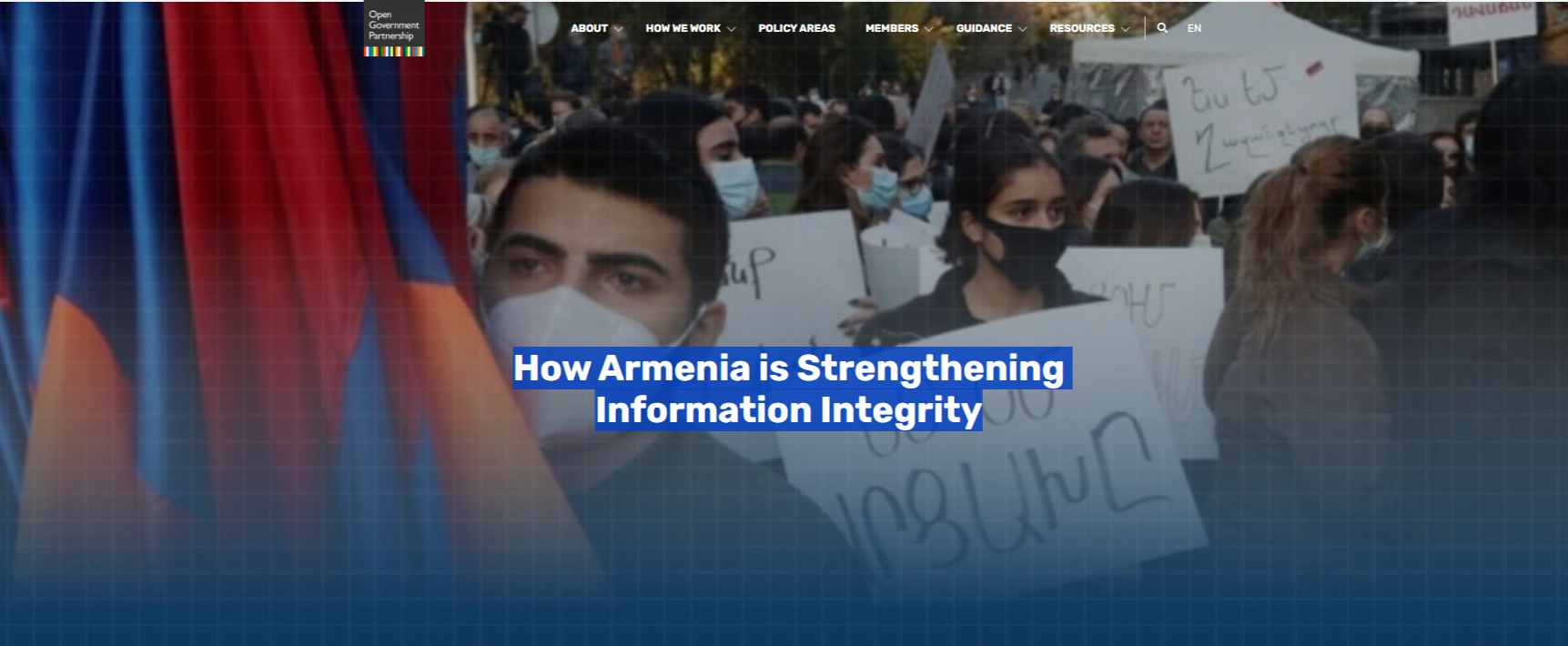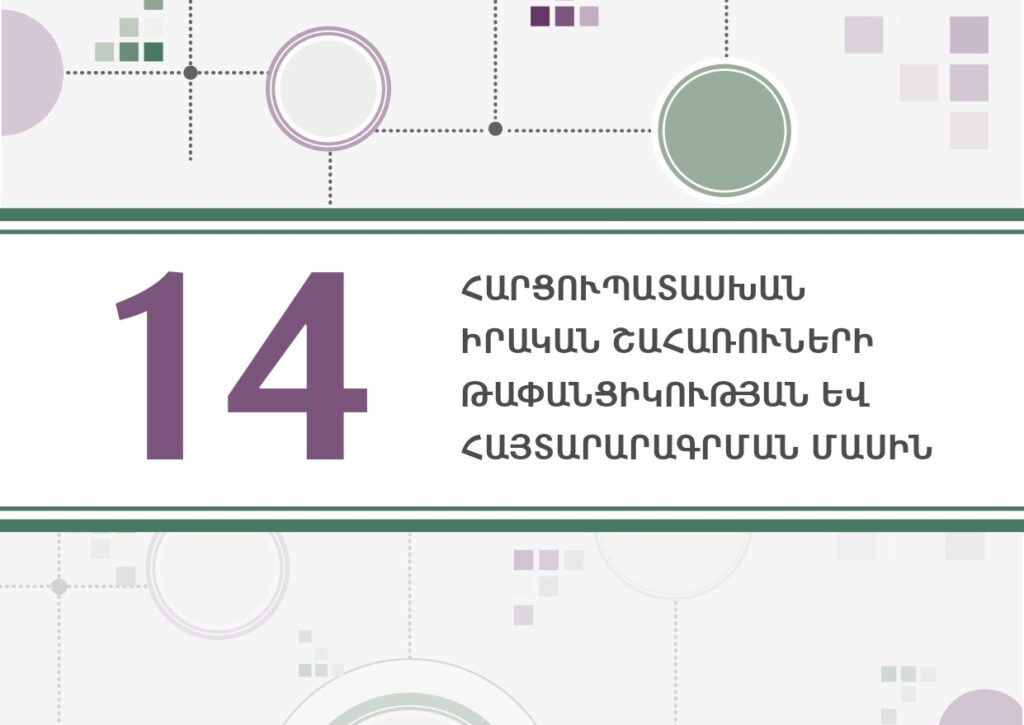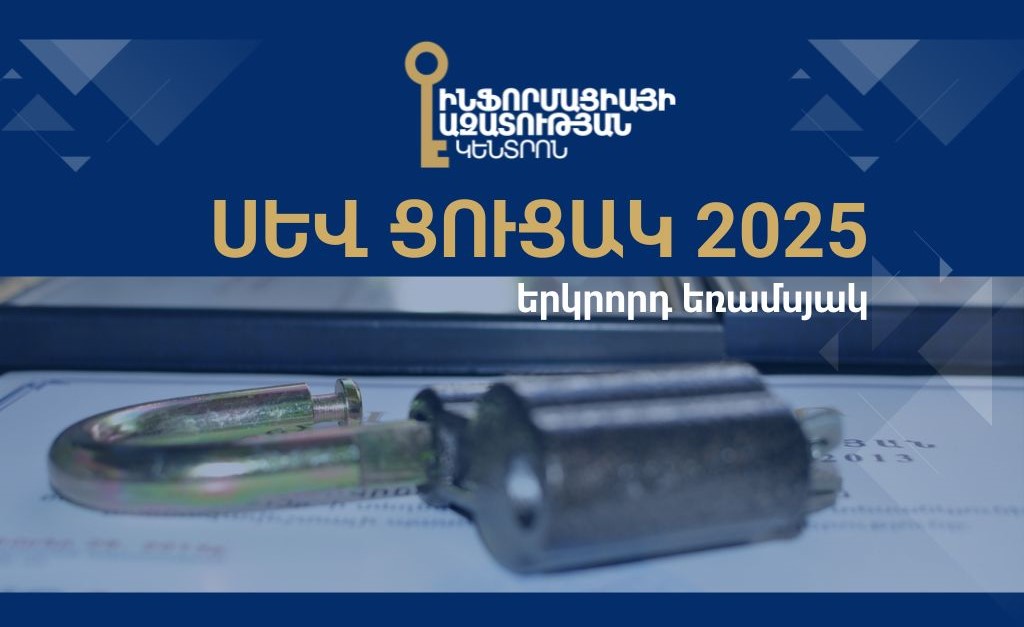By Gayane Papyan
“As an experienced accountant it is easy for me”, says Mrs. Gohar who has worked as an accountant for already 20 years and has learned by her own work experience that the taxpayer himself must be interested to dig and find the information needed. “She carries it all on her shoulders. The tax inspection cares little, it may say it has issued the law we should have known”, she says and as an illustration mentions numerous cases that have happened to her, when she witnessed the tax officer saying to the taxpayer, “You should have known, who is to blame for this? The law has been issued; we haven’t kept it a secret, have we? It has been sold in bookstores; the TV channels have covered the subject. You should have inquired, you should have worked properly.” In a way it may be understood. But to be frank they are hardly willing to make information available. If а taxpayer calls them to ask how to handle a certain problem, they will skip that matter. They will not provide detailed information but will just give slight instruction. It is good if one understands, if not then they can do their job within the frames of administrative fines, penalties and penalty actions”, mentions Mrs. Gohar with bitterness.
In order to find out what mechanisms the tax authorities use to inform the taxpayers about the tax legislation and amendments made, first we turned to the Department of Public Relations of the State Committee for Revenues of the RA Government. The tax authorities mainly provide timely and complete awareness to the taxpayers about the tax amendments, tax legislation, the application of the provisions of the adopted tax regulations by means of the notices posted on the bulletin boards in the tax inspections. Our visits to the tax authorities and our conversations with the taxpayers have revealed how successfully the tax inspection carries out its function of providing information.
The information boards on the walls of Spandaryan district Tax Inspection of the State Tax Service contain notices, government resolutions, reference samples, application forms. It is quite impressive at first sight, but most of them are already old stuff in fact. “When I came, I had some free time, so I decided to read the notices on the bulletin board. All of them are papers dated 2007”, says one of the taxpayers.
The deputy chief of the Tax Inspection Mr. Karen Sahakyan refused to provide official information motivating his refusal by the necessity of getting his supervisor’s permission, and the supervisor expected his supervisor’s permission in his turn. “In this case you will have to wait, for how long I cannot say”, warns Mr. Sahakyan considerately. It turns out that in order to photograph the information boards a permission of the supervisors is again needed even if it is done with the view of keeping the society informed. In Deputy Chief’s opinion I can only take amateur photos, by my mobile for instance, only for myself.
A floor downstairs Myasnikyan District Tax Inspection is located. Here also the notice boards contain application forms, instructions, notification papers, government resolutions, reference forms, orders… But like the previous ones most of them are out-of-date and need to be updated. My first job is to exercise my constitutionally stated and protected right of a journalist to take photos till I am compelled to get a supervisor’s permission here as well. Here taxpayers Babken and his wife are filling in some documents in the waiting lounge. “We are completely deprived of any information on this field. It is already 6 years we have worked and now they have issued these cash registers, for Cash Register Receipts ‘, says Babken. To the question ‘Will not you look through the laws in order to be able to work?’ he gives the following answer, ‘We have no knowledge, like first-graders.’ Another taxpayer says that he mainly buys literature on tax legislation from bookstores, but he learns about the amendments late. He hardly trusts Official Bulletins, ‘You never know what they contain and if they are worth buying. The content may be of no use to you, and I have no access to the Internet.’
“The law was amended on the 15th of April. I buy the Bulletin at the beginning of January for the laws in force for the given year, and I was not aware of any amendments. If you buy goods and sell them, fines are imposed from the moment of buying till the moment of selling, and we did not possess that information. We should have known beforehand that if the goods were for sale, the tax had to be paid at once.’ He means VAT deferral. ‘A lot of fines were imposed. We ask why they have not posted the information on the bulletin board of the Tax Inspection, they say that it is our duty to be informed’, the accountant tells us the story that has happened to him.
Shahumyan district Tax Inspection of the State Tax Service of the RA Government is less crowded than the previous ones. Here the camera fixes the wall-posted samples of applications (Sealing and Confirming Sales Books, Sealing and Confirming Revenue Books) and forms (Sealing and Confirming Cash Books, Submitting Applications to Chiefs), as well as the poster named “Three Simple Steps”, detailing the procedure of getting registered as a taxpayer. Notices and resolutions on Cash Registers prevail.
Thus, the regional tax authorities do not quite manage to cope with their duty of providing the taxpayers with information by means of notices posted on the walls, particularly with timely and complete information on amendments made, and the State Committee for Revenues fails to control, as “the posting is under the responsibility and supervision of regional authorities “, they clarify at the Public Relations Department of the State Committee for Revenues.
The official web site of the State Committee for Revenues http://www.taxservice.am, is a good source of information on tax sphere. “Generally I make use of the Tax Inspection official web site. I cannot say it is sufficient, there are certain things that are not easily understood, and you may say that they are written on purpose for us not to make out anything. The amendments appear on the site on time, but only the web site is not enough”, says one of the taxpayers. Unlike the notices posted on the walls in the tax inspections, the Web site can really be a satisfactory source of information. Tax Service, Tax Legislation, Tax Reforms, Registration by Tax Authorities, Tax Information, Tax Forms and Completion Instructions, Statistics, Tax Law Violations and Liability, Notices, Archives, Contact and other useful sections and subsections of the web site can greatly promote the acquisition of knowledge and information on this sphere.
At the Public Relations Department of the State Committee for Revenues they also informed us that within a year the State Committee for Revenues is planning to open five service centers for taxpayers throughout the country. ”A service center dealing with the acceptance of e-statements is already in operation, and Arabkir Service Center will open one of these days. Groups of highly skilled specialists will work at the centers, which will provide the taxpayers with consultation on all the questions that interest them”, we are assured at the Public Relations Department. The taxpayers can make use of the provided services in different ways: by visiting, calling, via e-mail (also ordinary mail) and fax. In some cases when the taxpayer is not provided with the necessary information at the moment, the answer will be given within 7 days at the utmost.
The State Committee for Revenues considers regional visits to be an efficient way of providing awareness. But in the regions only those, who live, work and pay taxes right there, know how the matter stands in reality. Lernik, who is a resident of Lori Marz, has paid taxes of about AMD 500 000 annually at Toumanyan Regional Tax Inspection for already 15 years. He gets tax information from tax inspectors, mainly verbally. But cases when the law is amended and the inspectors provide the information late are not rare. One must know the laws and the lack of knowledge does not release from liability. ‘But they amend a hundred laws every other month, you can hardly make them out even if you are a law expert,’ he complains. Lernik says that except for the notices about term changes for the submission of tax statements and suchlike there is no information on tax laws at all on the walls of Toumanyan Regional Tax Inspection. Problems have arisen several times because of the lack of information. ‘7-8 years ago I was told that when submitting annual statements, a mandatory tax of 15 per cent of the goods bought should be paid if the goods were got at the market without any certifying documentation. And in those days there was no certifying documentation at all. I faced a huge problem, as a tax of several hundred thousands accrued. I tell them had they warned me on the 29th or the 30th of December I would have terminated my company’s operation, they reply that I was supposed to know about it. But where from was I supposed to be aware of the decree dated December 28th?” he exclaims indignantly. In the regions, where the taxpayers have no chance of learning about current developments, where the Internet is not available, where only the satellite broadcasting of three Armenian TV channels is available, how can one expect the least degree of information awareness? Only one thing is certain: the farther the place is from the center, the more extensive unauthorized activities are exercised by the tax authorities and the harder the “supervisor’s” control becomes.
Numerous complaints of the taxpayers testify that the information on tax legislation and amendments made is far from being sufficient and available for people. And the authorities, who hold responsibility, forgetting the requirement of Article 10 of the Tax Law, namely to provide the taxpayers with timely and complete awareness of the tax amendments made, tax legislation, the application of the provisions of legal regulations, still continue assuring that getting tax information is merely the problem and responsibility of the taxpayers.











